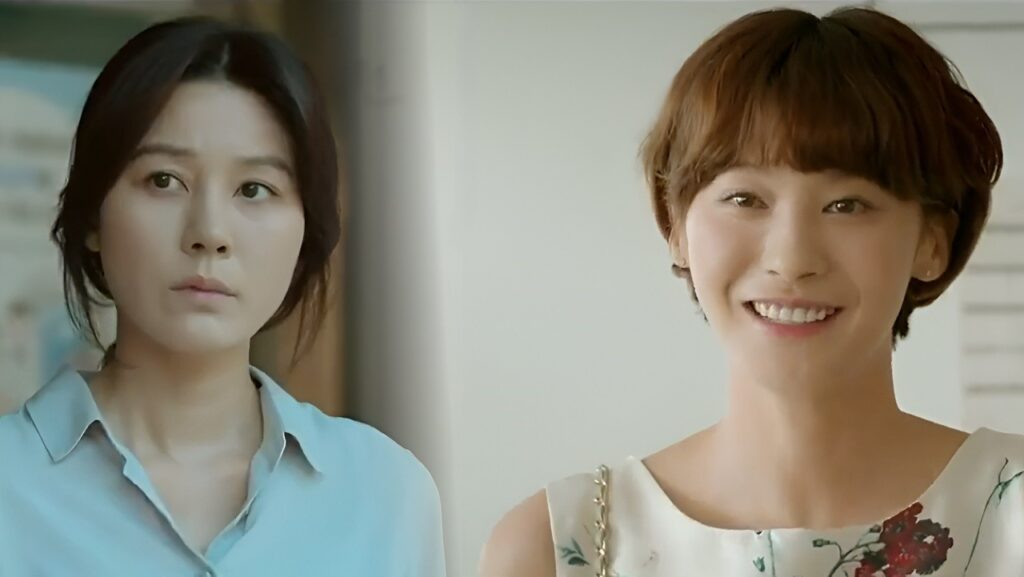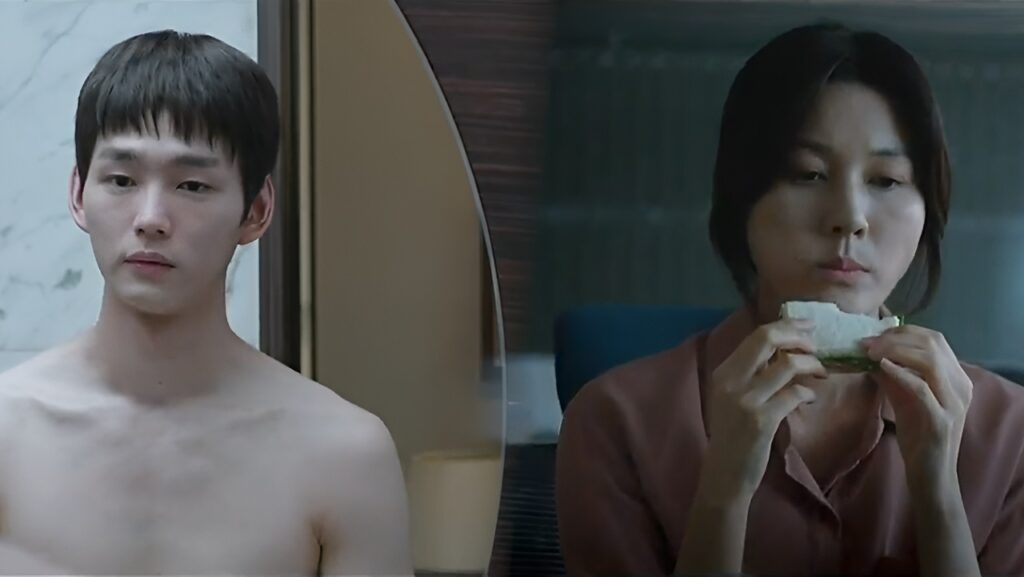This post includes a brief plot summary, an analysis and a review of the 2016 film “Misbehavior”. Beware of spoilers.

How far would you go to level an unfair playing field? “In ‘Misbehavior,’ director Kim Tae-yong shows how feeling wronged can mess with even the best people.
The 2016 Korean psychological thriller stars Kim Ha-neul as a struggling teacher whose resentment of a privileged colleague, played by Yoo In-young, sets off a chain of increasingly unethical and dangerous choices.
“Misbehavior” tells the story of a woman who has her own morals challenged when she falls for one of her students.
The protagonist, Hyo-joo, is a teacher at an all-boys high school, and her life is about to change with the arrival of a newcomer. Her name is Hae-young, and she has everything that Hyo-joo doesn’t: money, status, and a useful boyfriend.
Although Hae-young seems to have an upper hand in life, Hyo-joo is determined to change that. The latter finds out that Hae-young is having an affair with Jae-ha, one of her students, and uses this information to keep Hae-young “in line”.
Jae-ha is an underprivileged kid, but Hyo-joo is moved by his passion for dancing. So she decides to financially support him for his next competition. Everything runs smoothly until Hyo-joo decides to sleep with Jae-ha. Just like Hae-young, she also develops an intense affair with the teenage boy.
Hyo-joo sees her efforts paid off when Jae-ha wins the competition. But then she is confronted with the ugly truth: Jae-ha and Hae-young are still seeing each other. But that’s not all, the latter paid her lover to initiate an affair with Hyo-joo, so she could leverage that information against her. Things get worse for Hyo-joo when she finds out that the school is going to let her go.
Hopeless, Hyo-joo begs Hae-young to put in a good word for her, since Hae-young’s father is the school’s principal. The two women make peace, and Hae-young invites Hyo-joo to her place. While cooking for Hae-young, Hyo-joo experiences immense rage when she hears the woman bragging about playing with Jae-ha’s feelings.
Then, Hyo-joo does the unthinkable, she pours a pot of piping hot water onto an unsuspecting Hae-young, leaving her unconscious. After killing her victim, Hyo-joo lures Jae-ha to the apartment. They have sex, but Jae-ha coldly reaffirms that he never had feelings for Hyo-joo.
The morning after Jae-ha finds Hae-young’s body in the bathroom, leaving him horrified. At this point, Hyo-joo is no longer in the apartment. The ending of “Misbehavior” shows Hyo-joo at her workplace, sitting at the teachers’ room calmly eating a sandwich, while she awaits for the police.
Hyo-joo’s negative feelings towards Hae-young are a reflection of South Korea’s societal tension between the “haves” and the “have nots”.
Kim Tae-yong’s story explores the impact of class disparities on people, which are translated into Hyo-joo and Hae-young’s complex relationship. The contrast between Hyo-joo’s career and financial struggles with Hae-young’s apparent easy life is a mirror of South Korea’s society, which is characterized by strong social inequalities.
The power dynamics between Hyo-joo and Hae-young are not just personal, they are also based on age, status, and connections. For instance, because Hyo-joo is older than Hae-young, the latter often refers to her with utmost respect. But Hae-young’s privileged background and subsequent rich personal network allow her to have more opportunities in life than Hyo-joo.
“Misbehavior” highlights the intense pressure to conform and succeed in a highly competitive society.
Education is highly valued in South Korean society because it’s synonymous with social mobility. In that regard, Hyo-joo did everything perfectly. But as the audience has witnessed, education and hard work alone will only get one to a certain point.
Even though, education-wise, Hyo-joo is a role model, according to Korean society, she is almost “handicapped” in other areas. Hyo-joo’s struggles with job insecurity reflect the real-life challenges faced by many young professionals in South Korea, a ruthless job market.

As the story unravels, each character slowly sheds their layers, revealing their “less flattering side”.
One of the things that “Misbehavior” does particularly well is its nuanced character development. Hyo-joo’s transformation from a seemingly pushover and insecure individual to a manipulative woman was both satisfying and disturbing to watch. Although Hyo-joo’s actions are morally questionable, her desire for control and validation in a world that seems to only favour the powerful is understandable.
Hae-young is a puzzling character. On the surface, she is the perfect embodiment of privilege (money and good looks). But beneath her seemingly carefree personality there is a hint of desperation. She longs for connection and acceptance for a person that she knows very little and hates her deeply, Hyo-joo.
Jae-ha’s character arc was probably the biggest surprise in the entire film. Unlike what he initially led us to believe, he is not just a passive object of desire. Jae-ha is aware of his power over the two women and uses it to his advantage in this twisted love triangle.
The ending of “Misbehavior” provides a sharp contrast between the violence that took place before Hyo-joo’s apparent calm demeanour.
“Misbehavior” ends with a very chilling scene that will stick with the audience long after watching the film. The film doesn’t provide answers to what is going to happen to Hyo-joo and Jae-ha, it’s up to the audience to “judge them”.
In “Misbehavior”, there are no heroes or villains, only people and their desires.
As mentioned before, there are no perfect characters in this film. In this case, the pressure to professionally succeed was the primary catalyst for Hyo-joo’s unethical decision to blackmail Hae-young. Nonetheless, her decision to continue on the wrong path stemmed from jealousy and hedonism.
Final Thoughts
“Misbehavior” is not an easy watch, but it’s a noteworthy one. Although it may not be everyone’s cup of tea, viewers should give it a shot. The film has very unlikeable characters, which forces the audience to form their own moral stance on the characters’ decisions.
In my opinion, the pace of the film was just right. “Misbehavior” is a slow burner that allows tension to build gradually. Kim Tae-yong’s approach gives the audience more time to “digest” the characters motivations.
Performance-wise, Kim Ha-neul delivers a very solid and effective performance as the struggling Hyo-joo. Her portrayal of a jealous and insecure woman was subtle but powerful. She managed to convey a wide range of emotions, with very tiny changes on her posture and face. Overall, Kim Ha-neul made Hyo-joo both believable and disturbing, yet pitiful.
Final Rating: 


